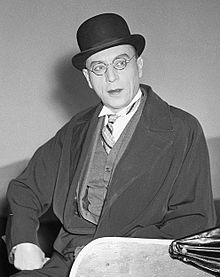Louis Jouvet
Jules Eugène Louis Jouvet (born December 24, 1887 in Crozon , † August 16, 1951 in Paris ) was a French actor , director , theater director and drama teacher, a highly respected and celebrated stage star in his country in the first half of the 20th century and a outstanding character actor in film of the 1930s.
Life
At the theater
Jouvet, a half-orphan since the age of 15, had completed an apprenticeship as a druggist before he decided to go into acting. He was rejected three times in the entrance exams to the Paris Conservatory , and so Jouvet began his acting career - first two test appearances on a stage in June 1907 - indirectly. From 1908 he first worked in the administrative department of a touring theater, before two years after his debut in Léon Noël's theater group he was allowed to work regularly as an actor for the first time. In 1911 he joined the Théâtre des Arts .
In 1913 Jouvet was appointed to Jacques Copeau's Théâtre du Vieux-Colombier , where he was employed as an actor but also as an outfitter and stage manager . In the same year he also made his debut in front of the camera at the side of his famous colleague Harry Baur . When the First World War broke out, Jouvet was drafted and served primarily as a medic . Back in civilian life, Louis Jouvet went on an extended tour to the USA in November 1917 with the company of the Vieux-Colombier. In 1922 he was appointed director of the Comédie des Champs-Élysées for the next twelve years , and in 1934 Jouvet took over the Théâtre de l'Athénée. As theater director and artistic director, Louis Jouvet has mainly and repeatedly performed plays by Jean Giraudoux , Jules Romains and Molière . His neoclassical staging style influenced the European theater of that time significantly.
In the first year of the German occupation of France by the German Wehrmacht, from June 1940 to June 1941, Jouvet took over the management of the most important French theaters. Immediately afterwards he went to French-speaking Switzerland for a film engagement and starred in an unfinished adaptation of Molière's Die Schule der Frauen , directed by Max Ophüls . He then traveled on to Latin America and via Cuba and Mexico to South America, where he only played theater with his own drama troupe. Later he and his troops received a personal invitation from the President of Haiti .
At the end of the war, Jouvet returned to France. Jouvet wrote down his experiences at the theater in a total of five books.
With the film
Jouvet's lean and angular face with the pointy nose was one of the most distinctive profiles in the film. There he appeared regularly since the early 1930s and received his first significant role in 1933 in the film Knock . In the same decade, Jouvet was able to play a plethora of very different characters. He played an impoverished Russian baron in Jean Renoir's night asylum (1936), the monk commissioned by the Holy Inquisition in Jacques Feyder's La kermesse héroique (1935), the once celebrated and now forgotten actor Saint Clair in retirement (1938), the carter of death in La charrette fantôme (1939) as well as a number of police inspectors ( Alibi , Between eleven and midnight , Une histoire d'amour ) but also all kinds of light-shy figures such as in Spies in Saloniki and Ramuntcho (1937).
In the early post-war years he had received a number of interesting roles - including as a detective inspector in Henri-Georges Clouzot's Under False Suspicion (1947) and in a new edition of the Knock film (1950), but was unable to continue his pre-war successes.
Filmography
- 1913: Shylock
- 1932: Topaze
- 1933: Knock (also assistant director)
- 1935: La kermesse héroïque
- 1936: Mister Flow
- 1936: Night asylum (Les Bas-fonds)
- 1936: Spies in Saloniki (Mademoiselle Docteur)
- 1937: Game of Memory (Un Carnet der bal)
- 1937: Alibi (L'Alibi)
- 1937: a strange case (Drôle de drame)
- 1937: Branded (Forfaiture)
- 1937: The Marseillaise (La Marseillaise)
- 1938: Ramuntcho
- 1938: Life is not a novel (La maison du Maltais)
- 1938: Hôtel du Nord
- 1938: Le drame de Shanghai
- 1938: love of theater (Entrée des artistes)
- 1938: Education du prince
- 1939: Retirement (La Fin du jour)
- 1939: La charrette fantôme
- 1939: The Deceived Deceiver (Volpone) (WP: 1941)
- 1939: Serenade (Sérénade)
- 1940: Untel père et fils
- 1941: L'école des femmes (unfinished)
- 1946: Shadow of the Past (Un revenant)
- 1946: In Teufels Krallen or Der doppelganger (Copie conforme)
- 1947: Under false suspicions (Quai des Orfèvres)
- 1947: Les amoureux sont seuls au monde
- 1948: Between eleven and midnight (Entre onze heures et minuit)
- 1948: return to life ( return à la vie)
- 1949: Lady Paname
- 1950: Dr. Knock lets ask (Knock)
- 1950: Miquette et sa mère
- 1951: Une histoire d'amour
literature
- Kay Less : The film's great personal dictionary . The actors, directors, cameramen, producers, composers, screenwriters, film architects, outfitters, costume designers, editors, sound engineers, make-up artists and special effects designers of the 20th century. Volume 4: H - L. Botho Höfer - Richard Lester. Schwarzkopf & Schwarzkopf, Berlin 2001, ISBN 3-89602-340-3 , p. 256 f.
Web links
- Louis Jouvet in the Internet Movie Database (English)
| personal data | |
|---|---|
| SURNAME | Jouvet, Louis |
| ALTERNATIVE NAMES | Jouvet, Jules Eugène Louis (full name) |
| BRIEF DESCRIPTION | French actor, director, drama teacher and theater manager |
| DATE OF BIRTH | December 24, 1887 |
| PLACE OF BIRTH | Crozon |
| DATE OF DEATH | August 16, 1951 |
| Place of death | Paris |
